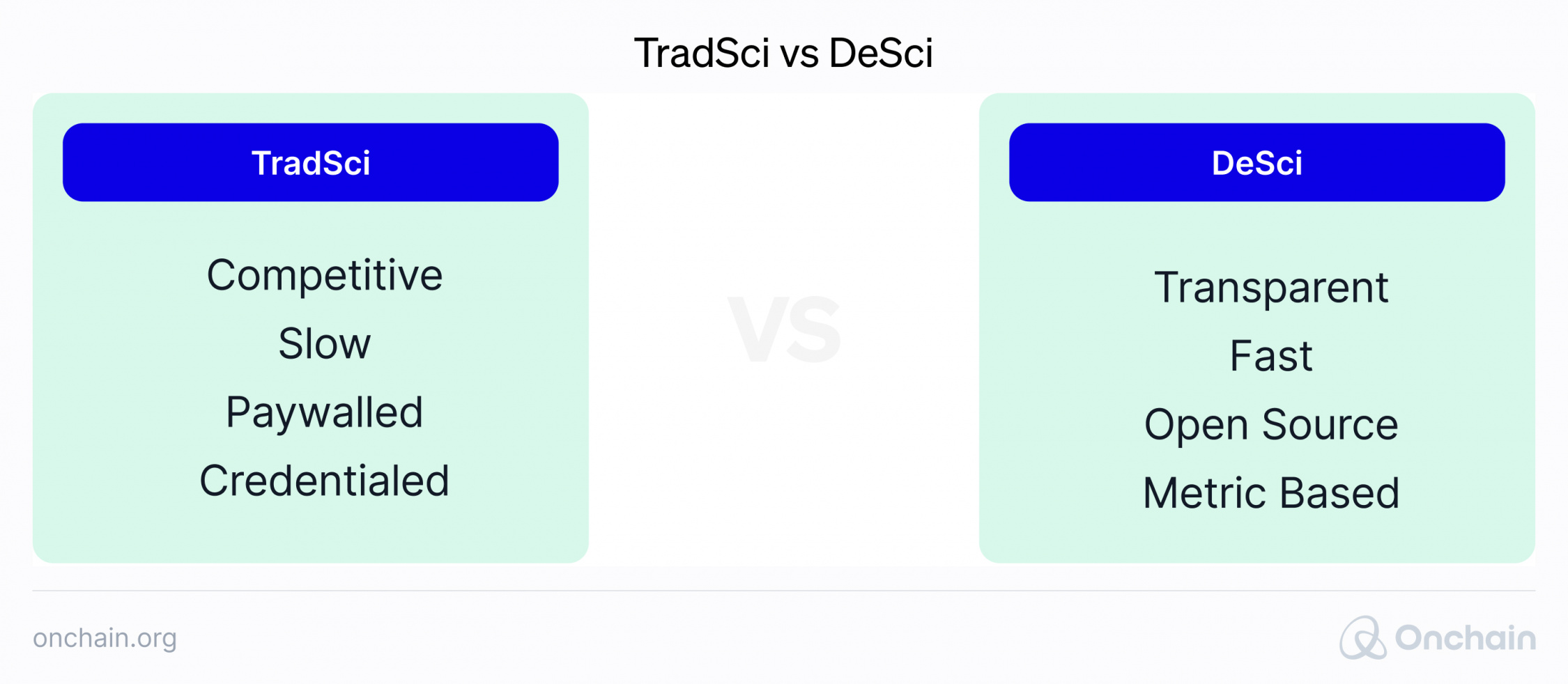There’s a new kid on the block that many in Web3 have yet to interact with. At many events, we still hear the question, “What is decentralized science?” This emerging industry is a small but powerful opportunity for impact-driven entrepreneurs.
From IP-NFTs to research DAOs, DeSci purports itself as the salve for the issues hampering scientific inquiry and beyond. Decentralized science projects aim to have real-world applications as part of their core offerings. We’re especially excited about what DeSci has to offer the business community and have created an in-depth DeSci report. First, let’s take a look at the history of DeSci.
To the moon: What is decentralized science?
Decentralized science (or DeSci) is a movement that applies the principles of the blockchain — transparency, trustless engagement, and democratized access — to traditional science.
Funding science on the blockchain first emerged in 2015, but didn’t become a coordinated movement until 2021 with the founding of several science DAOs. The earliest DeSci orgs aimed to enhance the structures of funding going to researchers and scientists, especially in niche areas. Today, DeSci includes data pools, research tokens, and funds sending people from underrepresented countries to space!

DeSci vs. traditional science: Improving upon an age-old model
Let’s zoom out to review how science has functioned for the past several centuries. For many, the halls of academia inspire images of dusty books on worn wooden stacks and odd traditional dress. Shoulder pads and elbow patches are still in vogue, and pocket protectors are a must-have to match the on-the-nose glasses researchers peer through.
Decentralized science is a phrase that won’t compute for such wizened professors.

Compare this to the excitement of the blockchain. We have a need for speed, are excited about shifting power to the masses, and believe everyone should have access to the knowledge of the world. Our own DeSci journey has aligned with those values.
Unfortunately, traditional science (or TradSci) holds much of its information behind the cloistered halls of academia and scientific institutions. One must pay to publish, and pay to read the recently published. Grant applications take an enormous amount of time, and the flow of money is not transparent. Industry incentives create personal bias in what gets researched and what gets published.
Even worse, many breakthroughs never emerge because funding runs out and the early results aren’t interesting enough for new grantors to see the project through.
Ultimately, TradSci limits the voices that speak toward progress to those with the right degree, background, career progress, and connections.
Breaking barriers: How to decentralize science
Since scientific research is hundreds of years old, its deep traditions may seem immutable. We understand if you’re wondering how to decentralize science. We’re so glad you asked.
Ingredients for a disruptive DeSci recipe

- A community that is eager to see the same problem solved: Blockchain and science are driven by community engagement.
Yes, community can equal funding, but it also provides a critical diversity that is so often lacking in TradSci. It validates citizen science and gives weight to good work rather than expensive credentials on a sheet of paper. This expanded access additionally accelerates science. - A clear vision of both the problem and solution: Let’s take the problem of funding, for example. Scientific funding takes up a significant portion of researcher’s time, reducing their availability for discovery. Add to that the issue of grantor bias and the overwhelming need for a marketable outcome, and you’ve got a solid problem on your hands.
The solution, then, is to streamline funding and incentives. Many DeSci organizations are funding research without the incentive for a marketable outcome. That includes publishing negative results! - Transparency within your docs, funding, and data: Just as we discussed the need for a clear vision of purpose to avoid funding pitfalls, your organization should also provide users and members with clarity about your activities.
Many DeSci orgs leverage open source tech or have developed their own, like IP-NFTs (NFTs with real utility). They solve the problem of transparency by reporting their activities to the public, and maximize the transaction history on blockchain to offer a funding trail to stakeholders.
DeSci for Web3: breaking Bunsen burners

DeSci breaks the traditional mold of science while equally breaking the mold of Web3. It brings real-world utility to non-Web3 communities and generates interesting social impact solutions.
As such, we’d be remiss if we didn’t highlight some of our favorite DeSci projects.
Who does DeSci? DeSci projects and their participants
We’re excited about DeSci crypto projects because of their implications on the wellbeing of both their members and the rest of the world. We believe that a well-developed blockchain project should be easy for non-Web3 native users to adopt, and the decentralized science ecosystem delivers. The research and activities that orgs like HairDAO and SERA are producing are perfect examples.
HairDAO crowd-sourced hair loss experiences from around the world and used the data to grow their own patented hair loss shampoo. Their model lowered the barrier to entry for hair loss research to anyone experiencing hair loss, whereas traditional research participation is far out of reach for most of the world.
SERA believes that more than three countries (USA, Russia, China) should be involved in space travel and research, and recently sent a man from Brazil into space. Their next move is to send a capsule of six people from underrepresented countries into orbit. Once again, we see the barrier to entry lowered far below TradSci.
Several DeSci projects, such as the DeSci Foundation and ResearchHub are addressing the lack of public access to scientific findings head-on, while LabDAO is working to shift access to scientific equipment for those outside of traditional institutional structures. Each of these projects is focused on a specific challenge that faces the scientific community head-on. We love that!
Decentralized science as a business opportunity

Decentralized science has an edge in Web3 because it is such a nascent industry. Of the 2441 DAOs listed on DeepDAO, only 25 fall into the decentralized science category. Yet all of them are ranked above 750/2441 for DeSci crypto holdings. DeSci projects at hackathons may be few and far between, but look good to investors and grantors because they bring real-world application and impact to the blockchain.
Social impact entrepreneurs will find DeSci for business interesting because:
- The industry is still very new, leaving wide funding opportunities and minimal competition in Web3.
- DeSci projects are focused on real-world application, making them attractive to investors that may be fatigued by DeFi and tooling ventures.
- Healthcare, science, and research are complex industries with big payoff. Decentralized education builds significantly on DeSci.
- Equally, these are evergreen industries with ongoing needs that will fuel a DeSci project throughout its many phases of growth.
Why the world needs more DeSci
These and many other examples are why we believe the world needs more DeSci. But there still remain some open questions about the future of the industry. Our goal at Onchain is to encourage more actionable projects such as those in the DeSci space to enter Web3.
The benefits of DeSci in Web3 are enormous. Where many have complained that blockchain projects are too abstract, too focused on theory or building blocks, DeSci’s output involves real-world applications with immediate impact on the lives of others. It solves many of the problems that conventional science has struggled with for generations and is currently an emerging market, ripe for entrepreneurial innovation and investment.
After this primer in DeSci, you’re ready to dive into its business applications. The next article has that in store for you. You’ll get a sense of the existing DeSci business models and why it’s such a hot industry. Use the button below to read on.



